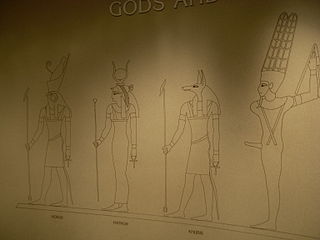Philosophy of religion is "the philosophical examination of the central themes and concepts involved in religious traditions". Philosophical discussions on such topics date from ancient times, and appear in the earliest known texts concerning philosophy. The field is related to many other branches of philosophy, including metaphysics, epistemology, logic and ethics.

Theism is broadly defined as the belief in the existence of at least one deity. In common parlance, or when contrasted with deism, the term often describes the philosophical conception of God that is found in classical theism—or conception found in monotheism—or gods found in polytheistic religions—or a belief in God or gods without the rejection of revelation as is characteristic of deism.

In Buddhism, Buddha, "awakened one", is a title for those who are spiritually awake or enlightened, and have thus attained the supreme religious goal of Buddhism, variously described as nirvana, awakening (bodhi) and liberation (vimutti). A Buddha is also someone who has fully understood the Dharma, the true nature of things or the universal law. Buddhahood is the condition and state of a buddha. This highest spiritual state of being is also termed sammā-sambodhi. This state is interpreted in many different ways in the various schools of Buddhism.
Bhakti is a term common in Indian religions which means attachment, fondness for, devotion to, trust, homage, worship, piety, faith, or love. In Indian religions, it may refer to loving devotion for a personal God, a formless ultimate reality or for an enlightened being. Bhakti is often a deeply emotional devotion based on a relationship between a devotee and the object of devotion.
Nontheism or non-theism is a range of both religious and non-religious attitudes characterized by the absence of espoused belief in the existence of God or gods. Nontheism has generally been used to describe apathy or silence towards the subject of gods and differs from atheism, or active disbelief in any gods. It has been used as an umbrella term for summarizing various distinct and even mutually exclusive positions, such as agnosticism, ignosticism, ietsism, skepticism, pantheism, pandeism, transtheism, atheism, and apatheism. It is in use in the fields of Christian apologetics and general liberal theology.

Buddhism includes a wide array of divine beings that are venerated in various ritual and popular contexts. Initially they included mainly Indian figures such as devas, asuras and yakshas, but later came to include other Asian spirits and local gods. They range from enlightened Buddhas to regional spirits adopted by Buddhists or practiced on the margins of the religion.
Generally speaking, Buddhism is a religion that does not include the belief in a monotheistic creator deity. As such, it has often been described as either (non-materialistic) atheism or as nontheism, though these descriptions have been challenged by other scholars, since some forms of Buddhism do posit different kinds of transcendent, unborn, and unconditioned ultimate realities.
Antitheism, also spelled anti-theism, is the philosophical position that theism should be opposed. The term has had a range of applications. In secular contexts, it typically refers to direct opposition to the belief in any deity.
Atheism is the rejection of an assertion that a deity exists. In a narrower sense, atheism is specifically the position that there are no deities and any statements to the contrary are false ones. The English term 'atheist' was used at least as early as the sixteenth century and atheistic ideas and their influence have a longer history.
Anussati means "recollection," "contemplation," "remembrance," "meditation", and "mindfulness". It refers to specific Buddhist meditational or devotional practices, such as recollecting the sublime qualities of the Buddha, which lead to mental tranquillity and abiding joy. In various contexts, the Pali literature and Sanskrit Mahayana sutras emphasise and identify different enumerations of recollections.

In monotheistic belief systems, God is usually viewed as the supreme being, creator, and principal object of faith. In polytheistic belief systems, a god is "a spirit or being believed to have created, or for controlling some part of the universe or life, for which such a deity is often worshipped". Belief in the existence of at least one god is called theism.

Brahmā is a leading God (deva) and heavenly king in Buddhism. He is considered as a protector of teachings (dharmapala), and he is never depicted in early Buddhist texts as a creator god. In Buddhist tradition, it was the deity Brahma Sahampati who appeared before the Buddha and invited him to teach, once the Buddha attained enlightenment.
Conceptions of God in classical theist, monotheist, pantheist, and panentheist traditions – or of the supreme deity in henotheistic religions – can extend to various levels of abstraction:

Buddhism and Hinduism have common origins in the culture of Ancient India. Buddhism arose in the Gangetic plains of Eastern India in the 5th century BCE during the "second urbanisation". Hinduism developed as a fusion or synthesis of practices and ideas from the ancient Vedic religion and elements and deities from other local Indian traditions. This Hindu synthesis emerged after the Vedic period, between 500-200 BCE and c. 300 CE, in or after the period of the second urbanisation, and during the early classical period of Hinduism, when the Epics and the first Puranas were composed.
Post-theism is the belief that the belief in a god belongs to a previous stage of human development and, thus, a division of theism vs. atheism is obsolete. It is a variant of nontheism. The term appears in liberal Christianity and post-Christianity.
In the philosophy of religion and theology, post-monotheism is a term covering a range of different meanings that nonetheless share concern for the status of faith and religious experience in the modern or post-modern era. There is no one originator for the term. Rather, it has independently appeared in the writings of several intellectuals on the Internet and in print. Its most notable use has been in the poetry of Arab Israeli author Nidaa Khoury, and as a label for a "new sensibility" or theological approach proposed by the Islamic historian Christopher Schwartz.

Polytheism the belief or worship of more than one god. According to Oxford Reference, it is not easy to count gods, and so not always obvious whether an apparently polytheistic religion, such as Hinduism, is really so, or whether the different apparent objects of worship are to be thought of as manifestations. Polytheistic belief is usually assembled into a pantheon of gods and goddesses, along with their own religious sects and rituals. Polytheism is a type of theism. Within theism, it contrasts with monotheism, the belief in a singular God who is, in most cases, transcendent.
The following outline is provided as an overview of, and topical guide to, theology.
Articles related to philosophy of religion include:
Nontheistic religions are traditions of thought within a religious context—some otherwise aligned with theism, others not—in which nontheism informs religious beliefs or practices. Nontheism has been applied and plays significant roles in Hinduism, Buddhism, and Jainism. While many approaches to religion exclude nontheism by definition, some inclusive definitions of religion show how religious practice and belief do not depend on the presence of a god or gods. For example, Paul James and Peter Mandaville distinguish between religion and spirituality, but provide a definition of the term that avoids the usual reduction to "religions of the book":
Religion can be defined as a relatively-bounded system of beliefs, symbols and practices that addresses the nature of existence, and in which communion with others and Otherness is lived as if it both takes in and spiritually transcends socially-grounded ontologies of time, space, embodiment and knowing.





